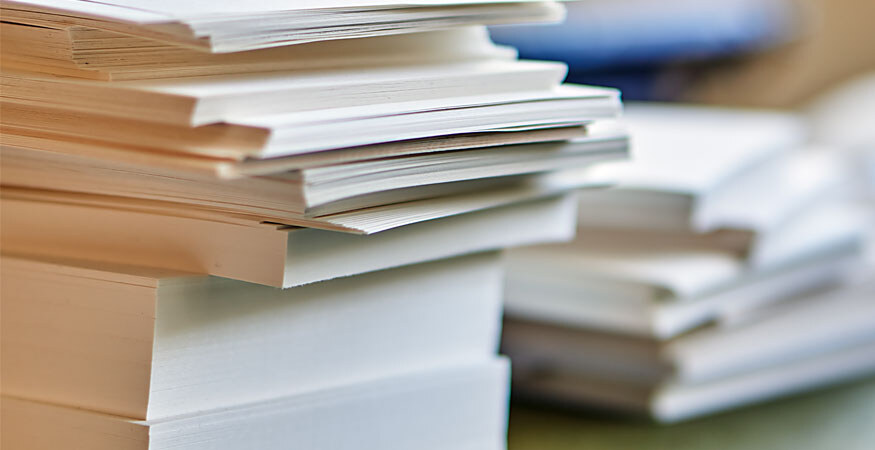In today’s fast-paced workplace environments, dealing with office printer paper jams can be a major inconvenience. In this article, we’ll uncover the ten most common culprits behind printer paper jam frustrations and give practical tips designed to reduce the risk of future jams.
So, let’s dive in and discover how you can keep your office printer running smoothly and efficiently. Some of the most common causes of office printer paper jams, include:
- Mixed Paper Types or Sizes
- Overfilled Paper Trays
- Poor Paper Quality or Condition
- Incorrect Paper Loading
- Low Quality Toner or Ink Cartridges
- Dirty Printer Rollers
- Old or Damaged Printer Parts
- Foreign Objects in the Printer
- Power Outage
- Lack of Regular Minor Maintenance
Mixed Paper Types or Sizes
Mixing different types or sizes of paper in the same tray can cause errors. The printer may have difficulty handling different paper weights or sizes at once and cause a malfunction, such as a paper jam.
TIP: If you need to print using different types of paper, use separate trays or manually feed the paper.
Overfilled Paper Trays
Overfilling the paper trays can also cause paper jams. When the tray is packed with too many sheets of paper, it can put excessive pressure on the paper stack. This makes it difficult for the printer to feed the paper smoothly.
TIP: To avoid this, only fill the paper tray up to its recommended capacity.
Poor Paper Quality or Condition
When using low-quality or damaged paper, there is a higher likelihood of paper jams. Low-quality paper is often of variable size, texture or thickness. If large enough, these variabilities can hamper the paper from moving smoothly through the printer.
Keeping your paper in good condition, is also important. Too much humidity can cause waves or wrinkles in the paper.
TIP: Store your paper in an environment that is temperature and humidity controlled. Do not store in basements, garages, etc.
RELATED: Tips and Hacks from a Certified Print Repair Professional
Incorrect Paper Loading
If the paper is not loaded properly into the paper tray or if it is not aligned correctly, it can lead to jams. To avoid this, make sure to load the paper neatly into the tray, aligning it with the guides.
TIP: When loading paper into the paper tray, check to make sure that the paper guides are not too tight or too loose. The paper stack should be able to move freely without getting stuck.
Low Quality Toner or Ink Cartridges
While compatible toner or ink cartridges are often less expensive, original equipment manufacturer (OEM) cartridges typically produce better quality print images with fewer paper jams.
TIP: Always purchase OEM toner or ink cartridges. This could save you from future paper jams or other, more costly, device repairs.
RELATED: DIY Office Copy Machine Repairs You Can Do
Dirty Printer Rollers
If the paper feed roller is dirty or paper powder is attached to it, paper may not feed into the printer, properly. Consult your printer manufacturer’s website for instructions on how to best clean the rollers. Instructions can differ by manufacturer or device model.
TIP: Ask your Gordon Flesch Company (GFC) Service Tech for tips on how to maintain your printer or troubleshoot minor concerns.
Old or Damaged Printer Parts
Wear and tear can take its toll on a printer. Especially if the device is used heavily or is not properly maintained. Old or damaged parts could impede the smooth flow of paper through the device. We suggest that you call a Service Tech if a printer part is found to be damaged or broken.
TIP: It is standard procedure for GFC Service Techs to look for worn parts when conducting an onsite service call.
Foreign Objects in the Printer
Foreign objects in the printer can also be a major cause of paper jams. These objects can include staples, paper clips, bits of torn paper or even dust and other debris. When these objects find their way into the paper path, they can disrupt the smooth flow of paper and lead to jams.
TIP: To better ensure jam-free operation, keep the printer area clean and free from debris.
Power Outage
In the event of a power outage, your printer will stop, and restart when the power is restored. It’s possible that printing will resume normally once power is restored. However, if paper is passing through a critical point in the printing process when the power is interrupted, a paper jam may occur. Follow the instructions on your device’s display to clear the jam.
TIP: Connect your printer to a surge protector. This will protect against power spikes that could damage your device.
Lack of Regular Minor Maintenance
Over time, dust, toner residue and other debris can accumulate in the printer's paper path, causing paper jams. It is important to regularly clean the printer to prevent this buildup.
Follow the manufacturer's instructions for cleaning the printer and use recommended cleaning materials. This will help maintain the printer's optimal performance and reduce the risk of paper jams.
TIP: When GFC Service Techs are onsite working on your printer, they also do a thorough cleaning to ensure optimal printing performance.
Is It Time For a Tech Check?
Need a second opinion on your company’s business technology? Download our free checklist to learn more about how a Business Technology Assessment by the experts at Gordon Flesch Company can provide a fresh perspective on the health of your network, identify any areas of concern and uncover how you might be able to improve productivity.










